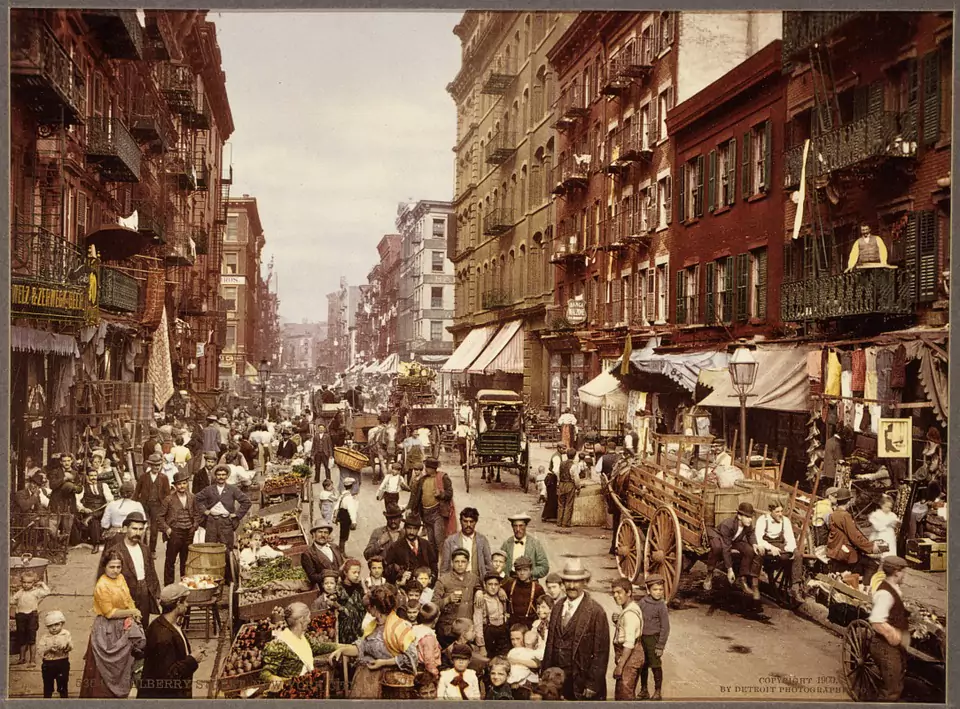 Early the other morning, I started out, not with the pleasure-seekers, but with those who toil the day long that they may live. Everybody was rushing–girls of all ages and appearances and hurrying men–and I went along, as one of the throng. I had often wondered at the tales of poor pay and cruel treatment that working girls tell. There was one way of getting at the truth, and I determined to try it. It was becoming a paper box factory girl. Accordingly, I started out in search of work without experience, reference, or aid.
Early the other morning, I started out, not with the pleasure-seekers, but with those who toil the day long that they may live. Everybody was rushing–girls of all ages and appearances and hurrying men–and I went along, as one of the throng. I had often wondered at the tales of poor pay and cruel treatment that working girls tell. There was one way of getting at the truth, and I determined to try it. It was becoming a paper box factory girl. Accordingly, I started out in search of work without experience, reference, or aid.

✅ AI Essay Writer ✅ AI Detector ✅ Plagchecker ✅ Paraphraser
✅ Summarizer ✅ Citation Generator
It was a tiresome search, to say the least. Had my living depended on it, it would have been discouraging, almost maddening. I went to a great number of factories in and around Bleecker and Grand streets and Sixth Avenue, where the workers number up into the hundreds. “Do you know how to do the work?” was the question asked by everyone. When I replied that I did not, they gave me no further attention.
“I am willing to work for nothing until I learn,” I urged.
“Work for nothing! Why, if you paid us for coming, we wouldn’t have you in our way,” said one.
“We don’t run an establishment to teach women trades,” said another, in answer to my plea for work.
“Well, as they are not born with the knowledge, how do they ever learn?” I asked.
“The girls always have some friend who wants to learn. If she wishes to lose time and money by teaching her, we don’t object, for we get the work the beginner does for nothing.”
By no persuasion could I obtain an entry into the larger factories, so I concluded at last to try a smaller one at No. 196 Elm Street. Quite unlike the unkind, brusque men I had met at other factories, the man here was polite. He said: “If you have never done the work, I don’t think you will like it. It is dirty work and a girl has to spend years at it before she can make much money. Our beginners are girls about sixteen years old, and they do not get paid for two weeks after they come here.”
“What can they make afterward?”
“We sometimes start them at weekly work—$1.50 a week. When they become competent, they go on piecework—that is, they are paid by the hundred.”
“How much do they earn then?”
“A good worker will earn from $5 to $9 a week.”
“Have you many girls here?”
“We have about sixty in the building and a number who take work home. I have only been in this business for a few months, but if you think you would like to try it, I will speak to my partner. He has had some of his girls for eleven years. Sit down until I find him.”
He left the office, and I soon heard him talking outside about me, and rather urging that I be given a chance. He soon returned, and with him a small man who spoke with a German accent. He stood by me without speaking, so I repeated my request. “Well, give your name to the gentleman at the desk, and come down on Monday morning, and we will see what we can do for you.”
And so it was that I started out early in the morning. I had put on a calico dress to work in and to suit my chosen trade. In a little bundle, covered with brown paper with a grease-spot in the center of it, was my lunch. I had an idea that every working girl carried a lunch, and I was trying to give out the impression that I was quite used to this thing. Indeed, I considered the lunch a telling stroke of thoughtfulness in my new role, and eyed with some pride, in which was mixed with a tad of dismay, the grease-spot, which was gradually growing in size.
Early as it was, I found all the girls there and at work. I went through a small wagon-yard, the only entrance to the office. After making my excuses to the gentleman at the desk, he called to a pretty little girl, who had her apron full of pasteboard, and said:
“Take this lady up to Norah.”
“Is she to work on boxes or cornucopias?” asked the girl.
“Tell Norah to put her on boxes.”
Following my little guide, I climbed the narrowest, darkest, and most perpendicular stair it has ever been my misfortune to see. On and on we went, through small rooms, filled with working girls, to the top floor–fourth or fifth story, I have forgotten which. Anyway, I was breathless when I got there.
“Norah, here is a lady you are to put on boxes,” called out my pretty little guide.
All the girls that surrounded the long tables turned from their work and looked at me curiously. The auburn-haired girl addressed as Norah raised her eyes from the box she was making, and replied:
“See if the hatchway is down, and show her where to put her clothes.”
Then the forewoman ordered one of the girls to “get the lady a stool,” and sat down before a long table, on which was piled a lot of pasteboard squares, labeled in the center. Norah spread some long slips of paper on the table; then taking up a scrub-brush, she dipped it into a bucket of paste and then rubbed it over the paper. Next, she took one of the squares of pasteboard and, running her thumb deftly along, turned up the edges. This done, she took one of the slips of paper and put it quickly and neatly over the corner, binding them together and holding them in place. She quickly cut the paper off at the edge with her thumbnail and swung the thing around and did the next corner. This, I soon found, made a box lid. It looked and was easy, and in a few moments, I was able to make one.
I did not find the work difficult to learn, but rather disagreeable. The room was not ventilated, and the paste and glue were offensive. The piles of boxes made conversation impossible with all the girls except a beginner, Therese, who sat by my side. She was timid at first, but after I questioned her kindly, she grew more communicative.
“I live on Eldrige Street with my parents. My father is a musician, but he will not go on the streets to play. He seldom gets an engagement. My mother is sick nearly all the time. I have a sister who works at passementerie. She can earn from $3 to $5 a week. I have another sister who has been spooling silk on Twenty-third Street for five years now. She makes $6 a week. When she comes home at night, her face and hands and hair are all colored from the silk she works on during the day. It makes her sick, and she is always taking medicine.”
“Have you worked before?”
“Oh, yes; I used to work at passementerie on Spring Street. I worked from 7 until 6 o’clock, piecework, and made about $3.50 a week. I left because the bosses were not kind, and we only had three little oil lamps to see to work by. The rooms were extremely dark, but they never allowed us to burn the gas. Ladies used to come here and take the work home to do. They did it cheap, for the pleasure of doing it, so we did not get as much pay as we would otherwise.”
“What did you do after you left there?” I asked.
“I went to work in a fringe factory on Canal Street. A woman had the place and she was unkind to all the girls. She did not speak English. I worked an entire week, from 8 to 6, with only a half-hour for dinner, and at the end of the week, she only paid me 35 cents. You know a girl cannot live on 35 cents a week, so I left.”
“How do you like the box factory?”
“Well, the bosses seem kind. They always say good morning to me—a thing never done in any other place I ever worked—but it is a good deal for a poor girl to give two weeks’ work for nothing. I have been here almost two weeks, and I have done a great deal of work. It’s all clear gain to the bosses. They say they often dismiss a girl after her first two weeks on the plea that she does not suit. After this, I am to get $1.50 a week.”
When the whistles of the surrounding factories blew at 12 o’clock, the forewoman told us we could quit work and eat our lunch. I was not quite so proud of my cleverness in simulating a working girl when one of them said:
“Do you want to send out for your lunch?”
“No, I brought it with me,” I replied.
“Oh!” she exclaimed, with a knowing inflection and amused smile.
“Is there anything wrong?” I asked, answering her smile.
“Oh, no,” she said quickly, “only the girls always make fun of anyone who carries a basket now. No working-girl will carry a lunch or basket. It is out of style because it marks the girl at once as a worker. I would like to carry a basket, but I don’t dare, because they would make so much fun of me.”
The girls sent out for lunch and I asked them about the prices. For five cents, they get a good pint of coffee, with sugar and milk if desired. Two cents will buy three slices of buttered bread. Three cents, a sandwich. Many times, a number of the girls will put all their money together and buy quite a little food. A bowl of soup for five cents will give four girls a taste. By clubbing together, they are able to buy warm lunches.
At one o’clock, we were all at work again. I, having completed sixty-four lids, and the supply being consumed, was put at “molding in.” This is fitting the bottom into the sides of the box and pasting it there. It is rather difficult at first to make all the edges come closely and neatly together, but after a little experience, it can be done easily.
On my second day, I was put at a table with some new girls and I tried to get them to talk. I was surprised to find that they were timid about telling their names, where they live or how. I endeavored by every means a woman knows, to get an invitation to visit their homes, but did not succeed.
“How much can girls earn here?” I asked the forewoman.
“I do not know,” she said; “they never tell each other, and the bosses keep their time.”
“Have you worked here long?” I asked.
“Yes, I have been here eight years, and in that time I have taught my three sisters.”
“Is the work profitable?”
“Well, it is steady; but a girl must have many years’ experience before she can work fast enough to earn much.”
The girls all seem happy. During the day, they would make the little building resound with their singing. A song would begin on the second floor, probably, and each floor would take it up in succession, until all were singing. They were nearly always kind to one another. Their little quarrels did not last long, nor were they fierce. They were all extremely kind to me, and did all they could to make my work easy and pleasant. I felt quite proud when able to make an entire box.
There were two girls at one table on piecework who had been in a great many box factories and had had varied experience.
“Girls do not get paid half enough at any work. Box factories are no worse than other places. I do not know anything a girl can do where by hard work she can earn more than $6 a week. A girl cannot dress and pay her boarding on that.”
“Where do such girls live?” I asked.
“There are boarding-places on Bleecker and Houston, and around such places, where girls can get a room and meals for $3.50 a week. The room may be only for two, in one bed, or it may have a dozen, according to size. They have no conveniences or comforts, and generally undesirable men board at the same place.”
“Why don’t they live at these homes that are run to accommodate working women?”
“Oh, those homes are frauds. A girl cannot obtain any more home comforts, and then the restrictions are more than they will endure. A girl who works all day must have some recreation, and she never finds it in homes.”
“Have you worked in box factories long?”
“For eleven years, and I can’t say that it has ever given me a living. On average, I make $5 a week. I pay out $3.50 for board, and my wash bill is at least 75 cents. Can anyone expect a woman to dress on what remains?”
“What do you get paid for boxes?”
“I get 50 cents a hundred for one-pound candy boxes, and 40 cents a hundred for half-pound boxes.”
“What work do you do on a box for that pay?”
“Everything. I get the pasteboard cut in squares the same as you did. I first ‘set up’ the lids, then I ‘mold in’ the bottoms. This forms a box. Next, I do the ‘trimming,’ which is putting the gilt edge around the box lid. ‘Cover striping’ (covering the edge of the lid) is next, and then comes the ‘top label,’ which finishes the lid entire. Then I paper the box, do the ‘bottom labeling,’ and then put in two or four laces (lace paper) on the inside as ordered. Thus, you see one box passes through my hands eight times before it is finished. I have to work extremely hard and without ceasing to be able to make two hundred boxes a day, which earns me $1. It is not enough pay. You see, I handle two hundred boxes sixteen hundred times for $1. Cheap labor, isn’t it?”
One bright girl, Maggie, who sat opposite me, told a story that made my heart ache.
“This is my second week here,” she said, “and, of course, I won’t receive any pay until next week, when I expect to receive $1.50 for six days’ work. My father was a driver before he got sick. I don’t know what is wrong, but the doctor says he will die. Before I left this morning, he said my father will die soon. I could hardly work because of it. I am the eldest child, and I have a brother and two sisters younger. I am sixteen, and my brother is twelve. He gets $2 a week for being an office-boy at a cigar-box factory.”
“Do you have much rent to pay?”
“We have two rooms in a house on Houston Street. They are small and have low ceilings, and there are a great many Chinese people in the same house. We pay $14 per month for these rooms. We do not have much to eat, but then father doesn’t mind it, because he can’t eat. We could not live if father’s lodge did not pay our rent.”
“Did you ever work before?”
“Yes, I once worked in a carpet factory at Yonkers. I only had to work there one week until I learned, and afterward I made a dollar a day at piecework. When my father got so ill, my mother wanted me at home, but now when we see I can earn so little, they wish I had remained there.”
“Why do you not try something else?” I asked.
“I wanted to, but could not find anything. Father sent me to school until I was fourteen, and so I thought I would learn to be a telegraph operator. I went to a place on Twenty-third Street, where it is taught, but the man said he would not give me a lesson unless I paid fifty dollars in advance. I could not do that.”
I then spoke of the Cooper Institute, which I thought every New Yorker knew was for the benefit of such cases. I was greatly astonished to learn that such a thing as the Cooper Institute was wholly unknown to all the workers around me.
“If my father knew that there was a free school, he would send me,” said one.
“I would go in the evenings,” said another, “if I had known there was such a place.”
Again, when some of them were complaining of unjust wages, and some of places where they had been unable to collect the amount due them after working, I spoke of the mission of the Knights of Labor, and the newly-organized society for women. They were all surprised to hear that there were any means to aid women in having justice. I moralized somewhat on the use of any such societies unless they entered the heart of these factories.
One girl who worked on the floor below me said they were not allowed to tell what they earned. However, she had been working here five years, and she did not average more than $5 a week. The factory in itself was an unfit place for women. The rooms were small and there was no ventilation. If case of a fire, there was practically no escape.
The work was tiresome, and after I had learned all I could from the rather reticent girls, I was anxious to leave. I noticed some rather peculiar things on my trip to and from the factory. I noticed that men were much quicker to offer their places to the working-girls on the cars than they were to offer them to well-dressed women. Another thing quite as noticeable, I had more men try to flirt with me while I was a box-factory girl than I ever had before. The girls were nice in their manners and as polite as ones reared at home. They never forgot to thank one another for the slightest service, and there was quite a little air of “good form” in many of their actions. I have seen many worse girls in much higher positions than the white slaves of New York.
Follow us on Reddit for more insights and updates.





Comments (0)
Welcome to A*Help comments!
We’re all about debate and discussion at A*Help.
We value the diverse opinions of users, so you may find points of view that you don’t agree with. And that’s cool. However, there are certain things we’re not OK with: attempts to manipulate our data in any way, for example, or the posting of discriminative, offensive, hateful, or disparaging material.